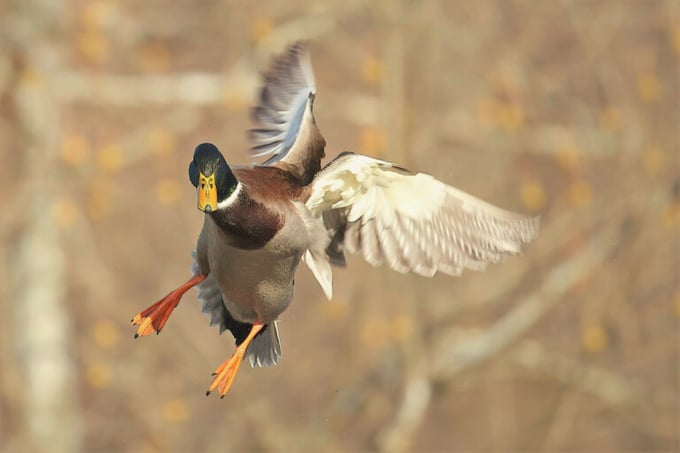November 27, 2025 | 10:12 GMT +7
November 27, 2025 | 10:12 GMT +7
Hotline: 0913.378.918
November 27, 2025 | 10:12 GMT +7
Hotline: 0913.378.918

The daily probability of infection from a single poultry farm via aerosolisation of contaminated faeces from wild waterfowl is extremely low, according to the researchers. Photo: Canva.
A study from Wageningen Bioveterinary Research involved the setting up of a semi-quantitative risk assessment for the introduction of highly pathogenic avian influenza (HPAIv) into poultry farms via aerosolised faeces of infected wild birds.
Based on the assessment, using a relatively simple model, the researchers estimated that the risk of this introduction route was very low. With support from the Statutory Tasks programme, the Wageningen researchers conducted follow-up research. For this, a quantitative and comprehensive microbial risk assessment model was developed.
Veterinary epidemiologist Armin Elbers said: “With this model, we can estimate the probability that the aerosolisation of faeces from HPAIv-infected wild birds in the vicinity of poultry farms results in infection of indoor-housed poultry.”
Model input parameters were retrieved from experimental data and scientific literature. Data availability was diverse across input parameters
“The daily probability of infection from a single poultry farm via aerosolisation of contaminated faeces from wild waterfowl is extremely low,” added Clazien de Vos, who jointly conducted the study with Elbers. Taking into account the total number of poultry farms and the length of the bird flu season, an HPAIv infection in poultry farms during the bird flu season in the Netherlands is to be expected once every 455 years via this introduction route.
Even under a worst case scenario, the probability of new infections is still very low: once every 17 years. This is a general estimate, averaged across different farm types, virus strains and wild bird species, and the results indicate the uncertainty is relatively high. But based on the modelling results, the researchers concluded that this route is unlikely to play a significant role in the occurrence of HPAIv outbreaks in indoor-housed poultry.
Other risk factors, such as failure to operate strict and consistent biosecurity measures, may be of greater importance in the introduction of HPAIv on poultry farms.
The risk assessment provides tools for preventing possible wind-supported transmission of HPAIv via particles of faeces from infected wild birds. Drying of HPAIv infected faeces from wild birds is a prerequisite for aerosolisation: “This practically only happens during the bird flu season when the droppings are deposited on concrete or stone-paved surfaces around poultry units. The probability of the occurrence of a chain of drying of HPAIv-contaminated bird droppings, subsequent aerosolisation and transport by wind of still infectious HAPIv via the air inlets of a poultry barn is very low,” added Elbers.
But to make this probability negligible, the researchers advise poultry farmers to regularly check for the presence of wild bird droppings on the paved surfaces around poultry houses and safely remove them. “This will also reduce the likelihood of the incidental introduction of HPAIv-contaminated wild bird droppings into the poultry house by sticking to the boots of people walking on the property and entering the barn,” he added.
(Poultryworld)

(VAN) A new study reveals how the simultaneous effects of ocean acidification, salinity and loss of oxygen are making the world more fragile.

(VAN) Hopes are growing that the creation of the first 3D turkey gut model could be a turning point in the battle against the virulent blackhead disease.

(VAN) Tyson, America’s biggest meat supplier, plans to shutter one of its largest beef processing plants as the industry continues to struggle with low cattle supplies and political pressure from Washington.

(VAN) New FAO study shows how digital solutions are empowering farmers and fishers to prevent losses and build resilient agrifood systems.

(VAN) Brazil's COP30 presidency pushed through a compromise climate deal on Saturday that would boost finance for poor nations coping with global warming but that omitted any mention of the fossil fuels driving it.

(VAN) Poultry farmers in the UK have been warned that they could face one of the worst winters yet for bird flu.

(VAN) Prices of main-crop paddy have risen sharply, with jasmine rice hitting 16,100 baht per tonne — the highest level in years.